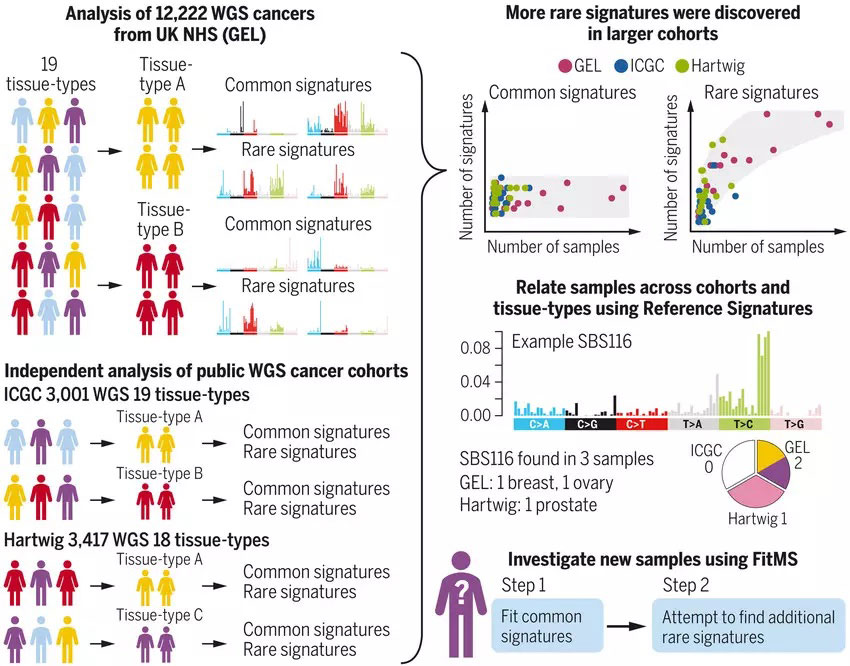6 new breakthroughs in the fight against cancer
Cancer scientists are using AI, DNA sequencing, precision oncology and other tech to improve treatment and diagnosis of the disease. Here are 6 advances. Breakthroughs include the DNA sequencing of more than 12,000 cancer tumours and a new test for diagnosing pancreatic cancer – one of the deadliest cancers.
- 12 May 2022
- 4 min read
- by World Economic Forum

Cancer killed nearly 10 million people in 2020 and is a leading cause of death globally, according to the World Health Organization.
Breast cancer, lung cancer and colon cancer are among the most common cancers.
Death rates from cancer were falling before the pandemic. Now COVID-19 has caused a big backlog in cancer diagnosis and treatment.
But medical advances are continuing to help the world fight cancer. Here are some recent developments.
Precision oncology
Precision oncology is the “best new weapon to defeat cancer”, the chief executive of Genetron Health, Sizhen Wang, says in a blog for the World Economic Forum. This involves studying the genetic makeup and molecular characteristics of cancer tumours in individual patients. The precision oncology approach identifies changes in cells that might be causing the cancer to grow and spread. Personalized treatments can then be developed. Because precision oncology treatments are targeted – as opposed to general treatments like chemotherapy – it can mean less harm to healthy cells and fewer side effects as a result.
Artificial intelligence fights cancer
In India, World Economic Forum partners are using emerging technologies like artificial intelligence (AI) and machine learning to transform cancer care. For example,AI-based risk profiling can help to screen for common cancers like breast cancer, leading to early diagnosis. AI technology can also be used to analyze X-rays to identify cancers, in places where imaging experts might not be available. These are two of 18 cancer interventions that The Centre for Fourth Industrial Revolution of the World Economic Forum India hopes to accelerate.

Image: Science/Cambridge University Hospitals
Clues in the DNA of cancer
At Cambridge University Hospitals in England, the DNA of cancer tumours from 12,000 patients is revealing new clues about the causes of cancer, scientists say. By analyzing genomic data, oncologists are identifying different mutations that have contributed to each person’s cancer. For example, exposure to smoking or UV light, or internal malfunctions in cells. These are like “fingerprints in a crime scene”, the scientists say – and more of them are being found. “We uncovered 58 new mutational signatures and broadened our knowledge of cancer,” says study author Dr Andrea Degasperi, from Cambridge’s Department of Oncology.
Liquid and synthetic biopsies
Biopsies are the main way doctors diagnose cancer – but the process is invasive and involves removing a section of tissue from the body, sometimes surgically, so it can be examined in a laboratory. Liquid biopsies are an easier and less invasive solution where blood samples can be tested for signs of cancer. Synthetic biopsies are another innovation that can force cancer cells to reveal themselves during the earliest stages of the disease.
CAR-T-cell therapy
A treatment that makes immune cells hunt down and kill cancer cells was recently declared a success for leukaemia patients. The treatment, called CAR-T-cell therapy, involves removing and genetically altering immune cells, called T cells, from cancer patients. The altered cells then produce proteins called chimeric antigen receptors (CARs). These recognize and can destroy cancer cells. In the journalNature, scientists at the University of Pennsylvania announced that two of the first people treated with CAR-T-cell therapy were still in remission 12 years on.
Nature research paper: Ten-year remission of leukaemia associated with CAR T cell therapy https://t.co/Vtv5Yik8SL
— nature (@Nature) February 2, 2022
Fighting pancreatic cancer
Pancreatic cancer is one of the deadliest cancers. It is rarely diagnosed before it starts to spread and has a survival rate of less than 5% over five years. At the University of California San Diego School of Medicine, scientists have developed a test that was able to identify 95% of early pancreatic cancers in a study. The research, published in Nature Communications Medicine, explains how biomarkers in extracellular vesicles – particles that regulate communication between cells – were used to detect pancreatic, ovarian and bladder cancer at stages I and II.
Written by
Victoria Masterson, Senior Writer, Formative Content
Website
This article was originally published by the World Economic Forum on 5 May 2022.
More from World Economic Forum
Recommended for you








